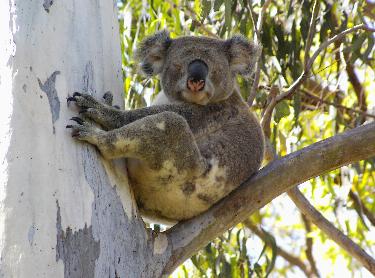How Much can a Koala Bare?

These uniquely Australian creatures that sit in trees and look cuddly. When the first fleet landed in Australia there were many strange and wondrous sights to behold. The odd looking furry animal that grunted like a bear was one. The koala was classed as a Pouched Bear in 1816 and not till much later identified as a marsupial (bearing tiny young that grow outside the body in a pouch)
They were hunted (which is a misnomer as they are sedentary and really cannot offer much in the way of defense) in the 1800’s for their pelts with hundreds of thousands being exported.
Inquiries about the need for care and rescue of these cuddly icons, it is clear they are highly specialised creatures which goes a long way to giving them their precarious position in the modern landscape. Even though we no longer hunt them for their pelts they are in danger of extinction and are already in some localities.
Wanda (aka Vanda) Grabowski
President/Secretary, Koala Action Inc.
Representative, Moreton Bay Koala Rescue Inc.
Secretary, Queensland Koala Crusaders Inc.
In Queensland all sick and injured koalas must be admitted into care within 72 hours after rescue at the latest for treatment. To care for a koala you have to know quite a bit about their physiology, behavioural traits and rehabilitation requirements. Long term carers undertake regular training and take courses updating their knowledge base.
A carer needs to be able to identify and access all the koala food trees. Part of being a carer is going out every day to cut fresh leaf from the full range of koala food tree species to ensure the joeys in your care can identify and eat all varieties.
Knowledge of supplementary feeding requirements and appropriate medication use is also useful as generally the joeys that come into care are not healthy.
Carers need to deal with one hourly, two hourly feeds of pinkies (60 gram joeys and up to 400 grams when they are furred).
As they get older the time between feeds increases to three, four hourly and eventually twice or three times a day.
Carers can chose to work predominantly with koalas over a kilo as you usually don’t have to provide supplements unless they haven’t recovered from their sickness or injuries so they just give them leaf. You also have to do most of the feeding at night, koalas are nocturnal and are most active from late afternoon to early morning.
Accessing leaf is an issue for all carers. You cannot cut browse from the wild because usually the trees are too tall to get to the tip. You don’t want to cut from the wild either because koalas living in the wild are struggling to eat enough browse themselves.
However, some councils do work with koala rescue groups in planting koala food tree plantations and maintaining them.
Koalas are a difficult species to work with and being a temporary/emergency carer isn’t the way it goes. Koala joeys bond with their carer as they would with their Mums.
Only one person can be their carer and it is a huge commitment of time, emotional and physical energy as well as resources i.e. money.
Carers usually have to pay for their own formula, supplements, teats, bottles, syringes, pouches and all the other essentials etc.
Carers will also need to have an outdoor facility for the joeys as they get older.
From 2.5 kilos and upwards they need to be able to climb poles, negotiate horizontals and be exposed to the elements prior to their admission into a pre release facility.
So to me the question is not so much about the need for these highly specialised and dedicated people who give their all to protect not “just an animal” but an ecosystem.
It is more pressing to ask WHY do we need so many carers?
Ways to Help can be accessed by visiting the link
Koala Action Inc is a registered organisation with ‘Containers For Change’. This scheme lets people get a 10 cent refund for each eligible container returned to a refund point. For more information about acceptable containers and refund points. please follow this link.
Scheme ID. 10 034 281
Funds go towards the purchase of koala food trees and other natives, mulch and water used in our planting projects. It also assists koala carers with the purchase of formula, medication and other essentials.



